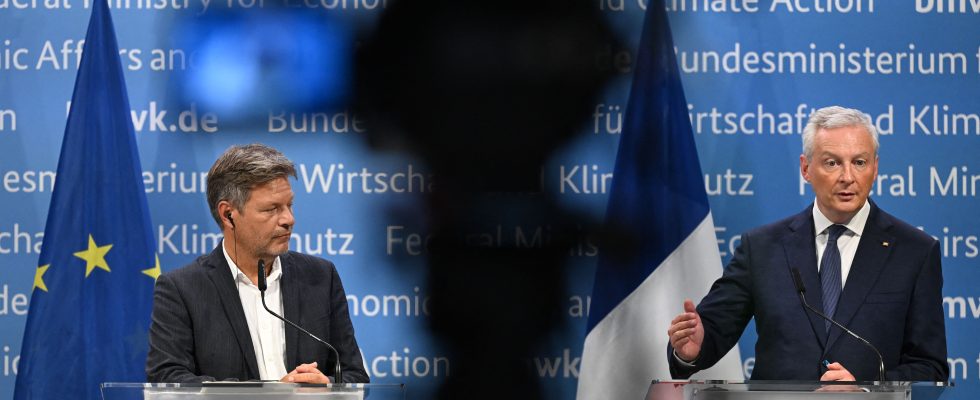In the opinion of the Minister of the Economy Bruno Le Maire, it is a “very good decision”. And for good reason. It was under pressure from France that the President of the European Commission Ursula von der Leyen announced this Wednesday, September 13, the opening of an investigation into Chinese subsidies for electric cars. A gesture welcomed by Paris, by EU manufacturers who denounce unfair competition, but also by Germany.
“Global markets are today flooded with cheap Chinese electric cars, the price of which is kept artificially low by massive public subsidies,” Ursula von der Leyen said in a speech to the European Parliament in Strasbourg. “Europe is open to competition. Not to a race to the bottom,” said the German official, receiving loud applause.
France prepares a reform of subsidies
France has been pushing in recent months for a Europe that asserts itself more in the face of practices considered protectionist by Beijing. Other member countries, such as Germany, which rely more on international trade, are traditionally more reserved, for fear of offending the Asian giant. But this time Paris and Berlin approved the initiative in unison.
If Chinese subsidies “do not comply with the rules of the World Trade Organization, Europe must be able to retaliate”, reacted Bruno Le Maire. “We want fair cooperation between China and Europe. That is not and cannot be weakness,” he insisted, he who hoped at the end of August, during a meeting in Paris with French bosses, a “European bonus reserved for industrial products with European content”. “This is what China does, this is what the United States does, this is what I still cannot do in Europe because of European standards,” he regretted. The government is also preparing a reform of subsidies for electric cars in France, which should soon be subject to an “environmental score” likely to limit Chinese imports.
“It is generally the right attitude,” said German Economy Minister Robert Habeck, during a joint press conference with his French counterpart, this Wednesday in Berlin. “It is not a question of excluding high-performance and cheap cars from the European market, but of seeing if there are hidden subsidies, direct or indirect, which represent an unfair competitive advantage,” he explained. .
The “anti-subsidy” investigation was also welcomed by the Association of European Automobile Manufacturers (ACEA), the sector’s main lobby in the EU. This announcement shows that “the European Commission recognizes the increasingly asymmetrical situation that our industry is facing and is urgently addressing the distortions of competition in our sector”, declared Sigrid de Vries, Director General of ACEA .
China has long relied on electric engines in automobiles and has taken a lead over Europe, particularly in battery technologies. Its manufacturers rely on their immense domestic market, the first in the world, to now conquer Europe thanks to the strong economies of scale from which they benefit.
Cheap imports from China “are already having an impact on the market shares of European manufacturers at home, with a massive increase in imports of electric vehicles in recent years”, underlined Sigrid de Vries. She also recalled that American government subsidies reserved for products manufactured in the United States, within the framework of the IRA (“Inflation Reduction Act”) favored the establishment of activities across the Atlantic.
European companies “are often beaten on price by competitors benefiting from enormous public subsidies. We have not forgotten how much our solar industry has suffered from China’s unfair commercial practices”, underlined Ursula von der Leyen. The president of the European executive, however, pleaded for a “dialogue” with Beijing. “We must defend ourselves against unfair practices. But it is equally essential to keep our lines of communication open and continue our dialogue with China. Because there are also topics on which we can and must cooperate,” she declared. “Risk reduction, not decoupling,” she insisted.
Trade Commissioner Valdis Dombrovskis immediately announced that he would travel to China next week “to discuss trade and economic opportunities and challenges”, in a message posted on X (formerly Twitter).
China has long relied on electric engines in automobiles and has taken a lead over Europe, particularly in battery technologies. Its manufacturers rely on their immense domestic market, the first in the world, to now conquer Europe thanks to the strong economies of scale from which they benefit.
